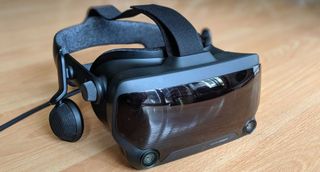New mystery Valve hardware device certified in South Korea
Could it be a new Deck, a controller or maybe a VR headset?

A new Valve hardware device has just received radio certification in South Korea, which is often a precursor to a wider release. But what, exactly, is it? The obvious candidates are a new Steam Deck, a controller or a VR headset.
Given what Valve has said regarding the Steam Deck 2, a new model or even a significant update doesn't feel imminent, so we'll rule that out. A new controller is a bit more plausible.
However, Valve discontinued the Steam Controller back in 2019 and the broad sense is that it along with the whole Steam Machine thing was rolled into the Steam Deck. So, a new controller seems unlikely, though not entirely impossible.
Which leaves us with a new VR headset. The existing Valve Index is an entirely wired and "dumb" unit meaning it's essentially just a display and can't run any software itself. It's also over three years old.
Meanwhile, this Korean certification is for some kind of wireless device. The new listing is also pretty much identical in its details to that of the Meta Quest 3, which is a relatively low cost wireless headset with its own CPU, GPU, RAM and storage.
So, one of the more likely prospects is that Valve is about to wheel out a new mainstream all-in-one wireless VR headset that doesn't require a PC, and has some kind of computing and OS onboard.
A new Valve hardware device just received radio certification in South KoreaValve Index was 1007Steam Deck was 1010??? is 1030https://t.co/AfgKorlyFZ pic.twitter.com/ECJPhqxTsuSeptember 7, 2023
The details are entirely speculative for now. The Quest 3 runs a Qualcomm Snapdragon chip. The precise specs haven't been released, but it will likely be related to if not identical to various smartphone Snapdragon SoCs. Realistically, that's the kind of chip you'd expect to see in a reasonably affordable Valve wireless headset.
The biggest gaming news, reviews and hardware deals
Keep up to date with the most important stories and the best deals, as picked by the PC Gamer team.
For starters, the chip will need to be fairly low cost. And the power constraints in a VR headset almost certainly dictate an ARM chip rather than an x86 CPU, even an ultra-low power item.
That said, the Steam Deck shows that Valve is absolutely up for commissioning genuinely custom silicon. The Deck's AMD Van Gogh APU can't be had in any other device and is substantially different to any other chip AMD produces.
So, some kind custom ARM-based SoC seems like a possibility. Then there's the question of operating and software. The underlying kernel will no doubt be Linux-based, but an ARM chip would mean that a simple reskinning of the Deck's Steam OS with a VR friendly interface isn't a goer.

Steam Deck review: Our verdict on Valve's handheld.
Best Steam Deck accessories: Get decked out.
Steam Deck battery life: What's the real battery life?
Likewise, the ARM CPU architecture would make it much more difficult to run existing Steam Deck titles on any new VR headset. A compatibility layer like Proton, which allows Windows games to run on the Linux-based SteamOS is possible. But it's a much harder job translating code from one hardware instruction set to another than it is for differing operating systems on the same hardware.
Again, it can be done. Apple's Game Porting Toolkit allows Windows x86 games to run on Apple MacOS and its ARM-based hardware. But you really want quite a powerful platform to do that kind of code translation on the fly. It's almost certainly too big an ask for a VR headset SoC.
All of which means if this new device is a stand alone wireless VR headset, and this is not the first time such a thing has been mooted, it'll need a brand new ecosystem of OS and games of its own. But if anyone can kickstart a major new platform like that, it's surely Valve.

Jeremy has been writing about technology and PCs since the 90nm Netburst era (Google it!) and enjoys nothing more than a serious dissertation on the finer points of monitor input lag and overshoot followed by a forensic examination of advanced lithography. Or maybe he just likes machines that go “ping!” He also has a thing for tennis and cars.
Most Popular






